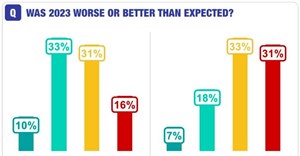
Ipsos poll: Who will be watching the 2018 FIFA World Cup?
- about a quarter (23%) say “I am a passionate soccer/football follower and will watch as many games as possible at any given time”
- another quarter (24%) say “I follow soccer/football, but will only watch games played by my favourite league/club and national team”
- three in every ten (30%) say “I will very occasionally watch soccer/football games played by leading league/club and national teams” and
- 23% say “I don’t follow soccer/football and do not watch soccer/football games at all”.
These are some of the findings of an online Ipsos study, conducted in 27 countries.
Interestingly, the host country, Russia, is one of those with the smallest proportion of passionate soccer supporters (only 9%) with a further 20% saying that they follow the game, but only when their favourite or national team is playing. Conversely, Saudi-Arabians, the host country’s opponents in the opening game on 14 June, are some of the most passionate soccer supporters, with more than four in every 10 (41%) online Saudis describing themselves as passionate soccer enthusiasts.
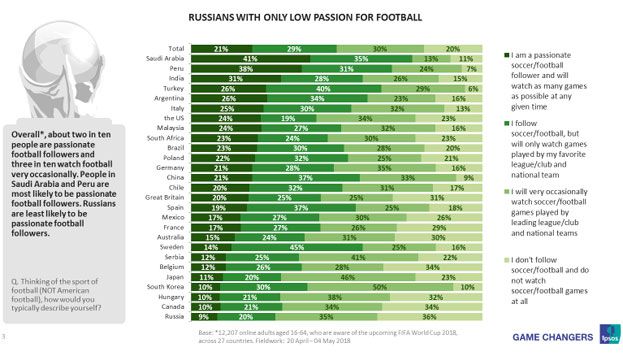
Looking at the international soccer-watching public’s opinion on which countries will come up tops, Germany and Brazil feature most prominently, also in South African opinions. While it will take more than a month before the winners and losers are determined, the spectacle will, without a doubt, attract a lot of attention worldwide.
South Africans are no exception and although about a quarter of online South Africans (27%) are saying that they do not plan to watch any games or have not decided yet if they wanted to watch any, about two thirds of online South Africans (65%) will be watching on television, on the internet (25%), on a mobile device (11%), on a tablet or an iPad (10%), they will listen on the radio (8%) or watch on another device 3%.
It is also certain that very few people will be watching the beautiful game on their own, in fact more than 80% of the people from the 27 countries surveyed, said that this will be an occasion to share with friends and/or family.
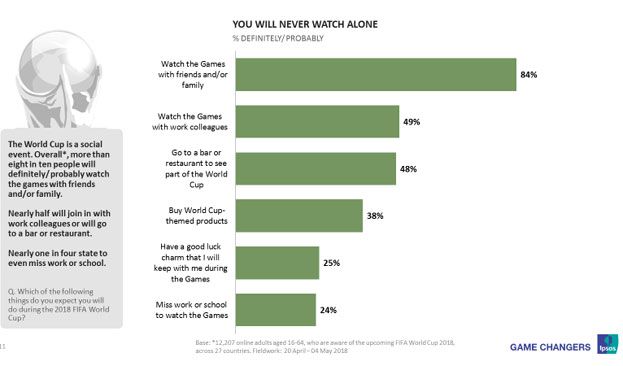
A similar figure of 86% of online South Africans also said that friends and family will watch soccer together, almost half (46%) will share the occasion with work colleagues and more than half (56%) will go to a bar or restaurant to see part of the World Cup. In keeping with the international trend, 39% of online South Africans will buy World Cup-themed products. 17% say that they will miss work or school to watch the games.
More than a quarter (26%) will not put their trust in skill, talent and preparation alone and will have a good luck charm that they will keep with them during the games. Online populations in India (63%), the USA (54%), China (45%) and Saudi-Arabia (40%) admitted that they will also keep their good luck charms close. Serbians seems to be the least superstitious as only 3% of them will keep a good luck charm on hand.
Although Ipsos found that Russians themselves were not necessarily the most enthused about their country’s role as host, the rest of the world begs to differ. Large proportions believe that Russia should benefit materially and in terms of image by hosting the World Cup.
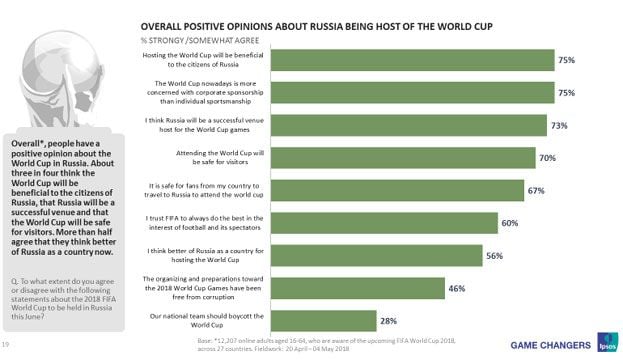
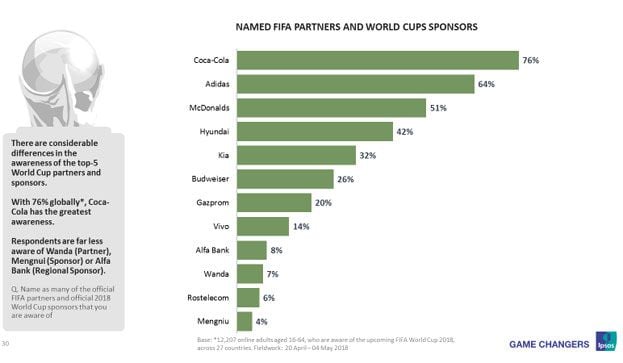
Although the awareness of sponsorships differs widely across the world, it has been seen from the previous slide that most people are aware of the big international brands sponsoring the event. South Africa is no exception to this rule (see below). To point out that some more local companies are also benefiting from partnering or sponsoring this international event, the awareness figures of the different brands in Russia and South Africa are listed below.
Name as many of the official FIFA partners and official 2018 World Cup sponsors that you are aware of:
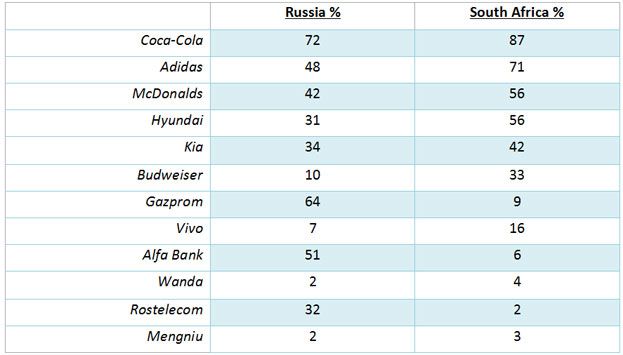
Technical detail:
In total, 19,766 interviews were conducted between 20 April and 4 May 2018. A screener identified 12,207 individuals who stated to have seen, heard or read about the FIFA World Cup. This group responded to the subsequent questions.
The survey was conducted via the Ipsos Online Panel system in 27 countries around the world. Approximately 1,000 individuals aged 16/18-64 were surveyed in Australia, Brazil, Canada, China, France, Germany, Italy, Japan, Mexico, Spain, Great Britain and the USA. Approximately 500 individuals aged 16-64 were surveyed in Argentina, Belgium, Chile, Hungary, India, Malaysia, Peru, Poland, Russia, Saudi Arabia, Serbia, South Africa, South Korea, Sweden and Turkey.
The data are weighted to match the profile of the population. In 16 of the 28 countries surveyed nationally representative samples were generated, but in Brazil, Chile, China, India, Malaysia, Mexico, Peru, Russia, Saudi Arabia, South Africa and Turkey an online study produces a national sample that is considered to represent a more affluent, connected population. These are still vital social groups to understand in these countries, representing an important and emerging middle class.
1The study is representative of South Africans who have regular online access.
- Unlocking the value of creativity in advertising: How to bridge the creativity gap15 Apr 13:47
- 4 habits keeping your brand poor26 Mar 16:08
- Understanding consumer mindsets for growth in 202407 Mar 08:52
- South Africa's unemployment nightmare: The burden on its people09 May 10:05
- Global survey shows shrinking trust in internet29 Nov 10:17



















